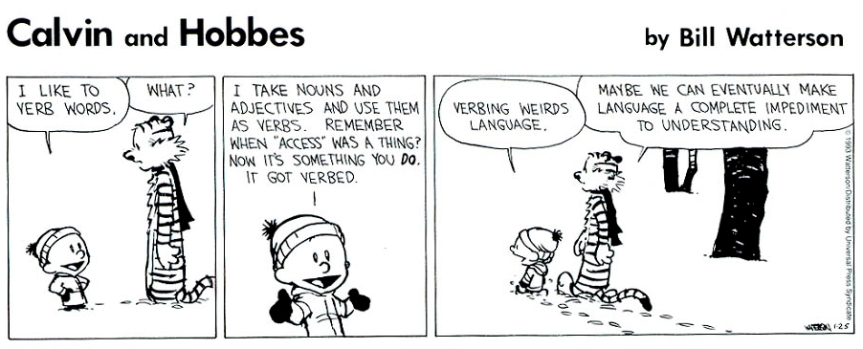This is something I absolutely want to do. It would be like Frindle, which is a book I haven't thought about in years, but seriously, what a great concept.
The article provides two methods: borrowing a word, and creating your own word.
Let's start with borrowing a word.
1. Start with a portmanteau
A portmanteau is apparently what you get when you mash two words together to make one word. The example given in this case is smoke+fog=smog.
It says I should make a list of my favorite words, but I think I'm just going to make a list of random words and see what I can come up with. Obviously, I will be consulting a random generator, in this case, randomwordgenerator.com.
Canvas, fashionable, revolution, appetite, pull, scale, crisis, ignore, wheel, spirit.
"canvasolution" - an artistic revolution involving canvas paintings
"Fashiontite" - an appetite for fashion
"Crisnore" - ignoring a crisis
Okay if there isn't already a board game where you take a list of random words and make as many words with definitions as possible, there should be. Who wants to help me create it? We could start a Kickstarter campaign or something.
2. Borrow from other languages
I already do this all the time because my brain never can settle on just one language and both English and Spanish can be expected to come out of my mouth at any given moment. I don't really consider borrowing from another language to be making a made up word, because it's already a word, it already exists.
I do however really enjoy the suggestion to watch a movie in a language you do not understand without subtitles and write down what you think it sounds like they're saying and use that to make up a word. This sounds like a fun game which I may pursue at some point.
3. Turn an object into a verb
I'm just gonna leave this Calvin and Hobbes strip here.

4. Take suggestions from a small child
Honestly this seems like pretty much the same strategy and listening to another language you don't understand, and that language in this case is either babbling or imagination. If anyone could make up a really cool new word to bring into the world, it would be a child.
From here it continues into "Method 2: Creating Your Own Word", but I'm not going to elaborate that method because it appears to want me "understand how words are created" and I don't feel like digging out my notes from that linguistics class I took in college. I think it's safe to say that we all understand enough about how words work to string some sounds together and think up a definition.
Making up words seems like a silly, whimsical activity, but people do it all the time. Authors especially seem to be the ones who are able to make them stick. Shakespeare, for example, made up a bunch of words all the time (or at least used them in a work of theater for the first time) and a lot of those words you probably use on a pretty regular basis. Like these 13 Words You Probably Didn't Know Were Invented By Shakespeare for example, including "gloomy", "majestic", and "frugal".
Here's a Mental Floss video of John Green listing a bunch of words invented (or at least recorded in a book for the first time) by authors.
There is also this much shorter list of 13 Words You Probably Didn't Know Were Coined By Authors if you don't want to listen to a 7 minute video on the matter.
There are however plenty of authors who do in fact practice whimsical word creating, like Dr. Seuss, or my personal favorite and nonsensical hero, Roald Dahl. Here is a list of 50 Amazing Words Roald Dahl Made Up, many of which I would like to incorporate into my everyday vocabulary.
I guess there is no way of knowing if any of these words were used before they were recorded by authors, let alone who was the first to use them, but I don't particularly have any suggestions of how to resolve this problem, unless someone finally gets around to inventing time travel, so I'm okay with giving the credit to the authors for now.
I also think that in our modern day society the internet has more to do with creating new words and presenting them to the general population.
This is the part of the blog post where I get overwhelmed by all the things I could possibly say about the topic and I have to stop. I hope you have a wonderfying and stupendelous day.
No comments:
Post a Comment